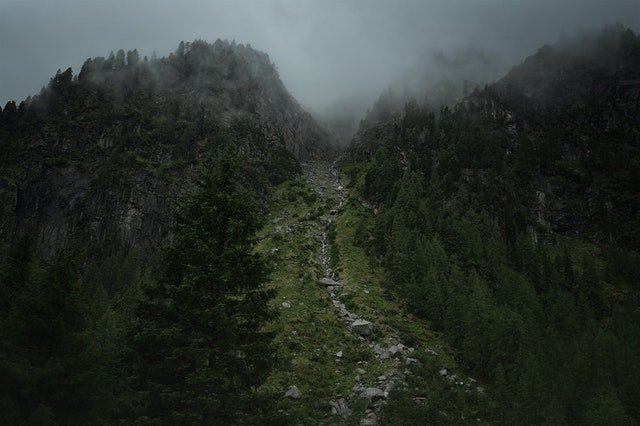Downhill
Downhill
Indrani Rai Medhi
Long, long after it was over, and the memory of those days were a hazy blur, the way the world looks when seen through rain-wet glass, the pieces fell into place in her head. It was that, after all. They were only playing a game, the Chinese checkers, or ludo, or Screw with cards. It was too cold to go out, the stove filled the house with smoke, the grey sofas, the round table and the fake creeper in the drawing room wall, and the two rooms with the yellow partition between them, the rumpled beds and clothes horse and Her green bag that hung by a nail next to the dresser, with its sprinkle of talcum powder and jars of cream and lotions that she used. So He dog-eared His book and smacked her for singing DO RE ME, imagining she was one of the Austrian pink and white children with the high spirited nanny that He had taken them to see in Dreamland.
There was a red welt across her cheek but she swallowed her scream for he hated screams, tears, sobs and all that came out when He showed them they were bad, she and her brother, and they were to be punished, to be brought back to the path, the long and the narrow. After the slap, she wished She would come in from the kitchen and bury her in Her chest but She went on stirring the lentils and pretending not to hear. And He started His game, throwing the dice as if it were. He dragged her like a rag doll, threw open the front door and snarled.
“Don’t ever come back.” The door slammed shut. She looked down and saw she was still in her house frock, the pink, faded one that was too short and a cardigan from which the wool was unravelling and her house slippers. She is climbing down the front stairs in her spindly legs, her wan, elfin face streaked with tears, sobbing and hiccuping at the same time. A bit of sugar cured the hiccups. Her grandma had said so. But she had nothing now. Not her toy furniture set, her picture books and cowrie shells. Not her paint brush and water colour box. In five minutes, she had lost all her clothes and shoes, the bed she slept in, the blanket that kept her warm, her place by the window from where she saw the pines swaying, and the silver stream below the ravine, and the sparrows always darting, alarmed. Without her books and uniform, she would not be let enter the classroom. She was a waif, a beggar girl, an orphan – all rolled into one. She began to walk down the hill, further from the house. The wind whistled at her. The pale sunshine refused to warm her frozen limbs. A wizened old man, a sack of potatoes on his back, trudged up the hill, puffing at his beedi. Families returned from Church, puffing up the hill. The tea seller sat in her tiny lean-to, counting the pennies in her purse. Then a coffin came in its hearse, pulled by men in dark clothes, murmuring prayers. She stood to let it pass and was not afraid. For she envied the dead person inside that wooden coffin, wreaths placed over it. That dead person was loved to the end. Nobody must have sent that dead person out in the cold in a pink house frock and an unravelling cardigan. All at once, she wanted to crawl into the coffin and travel majestically up the hill, past her house, further up to the tree shaded cemetery. He would never find her again and He would be dreadfully sorry and never lose His temper again. And her little brother would be safe.
But the hearse passed her by and she continued down the hill. There was a wooden shop on the right and they bought their provisions there. Sometimes, when He had beaten them more than He intended to, he got them Cadbury’s chocolates. This was when the bruises on her arms and legs were as purple as the chocolate wrapper. Purple was a nice colour to cover chocolates with. Brinjals were purple. There were purple streaks in the sunset. She had seen purple flowers in the grounds of the lake. The Bishop wore purple robes during the procession people lined up to see.
Further on, to her right, was the red brick house who had come from Pakistan and always remained indoors. There were the old parents and three grown-up sons with their wives and children. She talked of them sometimes, of them being of somewhere else. They had lost their country. This was too big a thing for her to understand. All she knew was that she had lost a home, a brother and a He and a She. Her face was contorted with grief and her mouth opened wide in soundless gulps. A drunk tottered towards her and clucked her chin. She fled down the road, her slippers slapping on the asphalt, howling.
Soon, crossing the stone bridge over the dirty nullah, she was on the main road. Beyond that lay the big world she knew not and what roads led where. And even if she did, surely she could not go to friends of the family. Nothing that happened in their house was ever to get out. That was the Law.
To her left was the petrol pump. Caltex it was called. Attendants in greasy over-alls filled the jeeps and taxis. No one paid any attention to her. Cars plied up and down the road. Stonyland, Kenches Trace. Some names came to her, like lines from a half-remembered song. A huge truck roared past, swishing her frock. It was impossible to cross the road alone. She would be knocked down and He would be so sorry when Do Re Me played on the radio.
She waited for the cars to pass. Her feet felt numb and her mouth was dry. There were no more tears to cry, just a tap going drip drip in her frozen heart. If someone would show her, she would go to the lake. There she would sit on the bank, among the nodding flowers, the chrysanthemums and petunias, and look down at the water. And there she would see Him, Her, her baby brother and herself smiling and at peace. In the water His voice and her cries would be liquid silence, His every cruel word swallowed by the shoals of wide-eyed fish that swam under the wooden arch of the green bridge. And with His words and her cries drowned in the generous heart of the lake, they would become an everyday family, a family where He raised his voice, but never His arm.
She remembered the baby boy she slept with every night. And now he would be alone. His pudgy fingers would search for her among the bedclothes. She would not now comb his bouncy curls, or bury her face into his neck for his milky scent. She would not now catch him if he stumbled, or dance when He was away. She longed with all her heart to see him again, the cherub who laughed into her ear and held her forefinger when He came home. He was her joy, her comfort, the reason for her living. And now he was taken from her and in her fevered brain, she thought of years to come, and the cruellest blow of all, him forgetting to laugh into her ear.
And there was Kit walking towards her. Kit was her classmate. With a gangly body and spiky hair.
“Where to?” he asked curiously.
“Just around,” she said.
“It’s going to rain. Where’s your umbrella?”
“I’m going to run home.”
“You look funny. Have you been crying?”
She smiled her sad, twisted smile.
“Of course not, Kit. I’m okay.”
“I know about you,” he said gently. “I can hear it from my house. Why does he beat you so?”
“He, He is a good man. I am naughty. Please don’t tell anyone. And Kit…
“Yes.”
“I won’t meet you anymore.”
“Why?”
I’m going away.”
“Where?”
“To the equator.”
The sun disappeared behind a bank of clouds. The wind blew up little clouds of dust. In the distance, the church bells rang. She did not know the time. It now seemed an eternity since she was turned out from her house in her house frock and unravelling sweater. Even though she was awake she seemed to be asleep. So if she really awoke, would He become a feeble old man? Would He and She recognise her? If they didn’t she would be free. For they could not hurt one they did not know. And yet, how much did they know her? Within her puny body was an ocean of thoughts she never revealed. She swam and played in her secret ocean, drifting with the low tide, riding the crest of her waves. She travelled to lands where the one-eyed cyclops lived and two wolf-boys set up a city. She was at home in the loneliest place in the world – the Tierra Del Fuego and rode the wild horses at Camargue. But she did not know how to cross the street and how to leave without goodbyes. Plop, plop the raindrop pennies fell on her nose, her arm. She looked up at the vastness of the sky and terrified, looked away again. Then, from far away, came the putter of an engine. She would recognise it instantly even from the hum of other cars. It came from behind her, nearer, nearer, even as she tried to unravel the strand of wool on the sleeve of her sweater. Then He stopped his Lambretta beside her. Balancing his legs on the ground. He looked at her frowning, then a little amused. She had suffered. She had learnt her lesson. She would never sing when he was reading.
“Get up.” He said. She climbed into the back seat. She hugged Him around the middle, so that she would not fall.
Her toys, her clothes, her corner of the window, her baby brother, suddenly, all these became possible. Tears pricked her eyelids but she wiped them away. At home she was served lunch. It was egg curry, bean fry, lentils and rice. She ate quickly, gratefully, then crawled into her bed, throwing the duvet over her numb body. Soon she was deep asleep, lost in a purple colour dream. The game was over, for now.

Indrani Rai Medhi is a journalist, columñist and author. She has won the Kunjabala Devi award for investigative award for women issues and the Yamin Hazarika award for excellence. She has authored 12 books.




